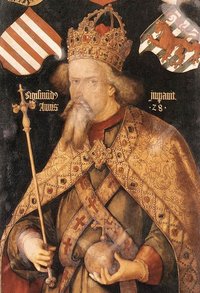Sigismund, Holy Roman Emperor
|
|
Sigismund (February 14/15, 1368 - December 9, 1437) was Holy Roman Emperor from 1433 to 1437.

The third and last German Emperor and fourth Bohemian king of the Luxembourg dynasty, Sigismund, second son of the Emperor Charles IV, was born in Nuremberg.
Sigismund was margrave of Brandenburg from 1378, succeeding his father, until 1388 when he handed it to his cousin Jobst of Moravia. After Jobst's death in 1411, be again became margrave of Brandenburg until 1415, when he granted the territory to Frederick I, Margrave of Brandenburg, burgrave of Nuremberg, making the Hohenzollern family one of the most important in Germany.
Through his marriage to Mary, queen (1382-1385 and 1386-1395) of Hungary, Sigismund became the country's king in 1386 despite opposition among the nobility. In 1396 he organised a crusade to repel the Ottoman Turks, who were threatening Hungary from the south, but the Christian forces were routed at the Battle of Nicopolis (now Nikopol, Bulgaria).
In about 1406 he remarried with a Slovenian noblewoman Barbara Celjska (Barbara of Celje), daughter of Hermann II, Count of Celje (Cilli).
In 1410, in a disputed election, Sigismund was elected emperor of the Holy Roman Empire. His rivals to the title were his elder half-brother Venceslaus of Bohemia, who had never accepted his deposition as emperor ten years earlier, and Jobst of Moravia, who was elected in a rival election. However, Jobst died a few months later and Wenceslaus then resigned his claim to the empire in favour of Sigismund, leaving Sigismund universally recognised as emperor.
As emperor, Sigismund was instrumental in helping convene the Council of Constance (1414 - 1418), which ended the Papal schism and — of great consequence to Sigismund's future career — burned the Czech religious reformer Jan Hus at the stake for heresy in July 1415. Sigismund had promised Hus a safe-conduct to the Council but, keen not to endanger the success of the Council, did nothing more than protest verbally when the Council disregarded the safe-conduct and arrested Hus.
It was as king of Bohemia from 1419 in succession to Wenceslaus IV that Sigismund faced the greatest challenge of his reign. Because of his part in the burning of Hus, Sigismund was ejected by the Hussite forces on his attempt to take over the country (1420). A bitter conflict (the Hussite Wars) continued for 15 years, extending across Bohemia's borders. Only in 1437, the year of his death, Sigismund was accepted by the major Czech factions.
Sigismund had no children by Mary of Hungary, but he had a single daughter with Barbara Celjska, Elizabeth (1409-1442). Elizabeth married Albert II, Holy Roman Emperor, who was eventually to succeed his father-in-law as King of Hungary and Bohemia, and as German King.
Names in other languages: German: Sigismund, Hungarian: Zsigmond, Czech: Zikmund, Slovak and Croatian: Žigmund, Slovene: Sigismund Luksemburški
| Preceded by: | 'King of the Romans' Also Holy Roman Emperor | Succeeded by: |
| Rupert | Albert II |
| Preceded by: | 'King of Bohemia' | Succeeded by: |
| Wenceslaus IV | Albert of Habsburg |
de:Sigismund (HRR) eo:Sigismondo de Luksemburgio fr:Sigismond Ier du Saint-Empire nl:Sigismund van het Heilige Roomse Rijk ja:ジギスムント (神聖ローマ皇帝) pl:Zygmunt Luksemburski sl:Sigismund Luksemburški
